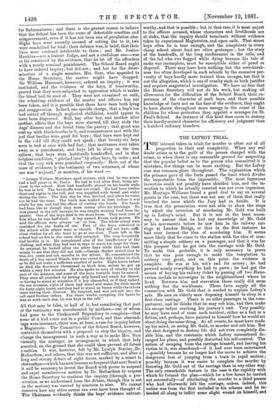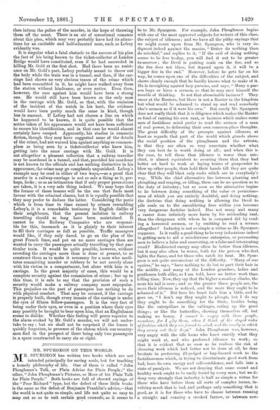THE LEFROY TRIAL.
THE interest taken in trials for murder is often out of all proportion to their real complexity. When any. real doubt exists as to the guilt of the person charged with the
crime, or when there is any reasonable ground for suspecting that the popular belief as to the person who committed it is mistaken, few things can be more exciting. But the Lefroy case was common-place throughout. The explanation which the prisoner gave of the facts passed the limit which divides
the improbable from the impossible. The most ingenious invention could not possibly have shielded him, and the in- vention to which he actually resorted was not even ingenious. Mr. Montagu Williams found a good deal to say on several points in the case, but there was not one of them that really touched the issue which the Jury had to decide. It is true that the prosecution were not able to show the steps by which the intention of murdering Mr. Gold was built up in Lefroy's mind. But it is not in the least neces- sary to assume that he had any knowledge of Mr. Gold or his movements before he saw him in the railway car- riage at London Bridge, or that in the first instance he had even formed the idea of murdering him. It seems more likely that he came to the station with the idea of com- mitting a simple robbery on a passenger, and that it was for this purpose that he got into the carriage with Mr. Gold. To make this probable, it is only necessary to prove that he was poor enough to make the temptation to robbery very great, and on this point the evidence is complete. He was at his wit's end for money ; he had pawned nearly everything he had to pawn ; he had got the means of buying his railway ticket by passing off two Hano- verian medals as sovereigns in the neighbourhood where he lived. Between him and starvation there really did seem nothing but the workhouse. These facts supply all the connection with Mr. Gold that is needed to explain Lefroy's acts. He sees an elderly man disposing himself to sleep in a first-class carriage. There is no other passenger in the com- partment, and he thinks that he may rob him, and then make his escape befgre reaching his journey's end. Very possibly he may have read of some such incident, either as a fact or a fiction, and, perhaps, have painted to himself how he would set about doing the same thing. At all events, he must have made up his mind, on seeing Mr. Gold, to murder and rob him. But the shot designed to destroy life did not even completely dis- able him, and the resistance which Lefroy encountered de- ranged his plans, and possibly disturbed his self-controL The notion of escaping from the carriage himself, and leaving his victim in it, was abandoned—if it had ever been entertained —possibly because he no longer had the nerve to achieve the dangerous feat of jumping from a train in rapid motion ; possibly because it was easier to complete the murder by throwing Mr. Gold out of the carriage than in any other way. The only remarkable feature in the ease is the rapidity with which he formed the plan—which for a few hours he carried out successfully—of attributing the murder to a third person who had afterwards left the carriage, unless, indeed, this notion was from the first included in his scheme and he in- tended all along to inflict some slight wound on himself, and
then inform the police of the murder, in the hope of throwing them off the scent. There is an air of sensational romance about this plan, which may very probably have had its attrac- tions for an excitable and half-educated man, such as Lefroy evidently was.
It is singular what a fatal obstacle to the success of his plan the fact of his being known to the ticket-collector at London Bridge would have constituted, even if he had succeeded in killing Mr. Gold at the first shot. Had there been no resist- ance on Mr. Gold's part, Lefroy probably meant to throw out the body while the train was in a tunnel, and then, if the car- riage had shown no very obvious traces of the crime which had been committed in it, he might have walked away from the station without hindrance, or even notice. Even then, however, the case against him would have been a strong one. He would still have been known as the only man in the carriage with Mr. Gold, so that, with the omission of the incident of the watch in his boot, the evidence would have been pretty much the same in kind, though less in amount. If Lefroy had not chosen a line on which he happened to be known, it is quite possible that the notice taken of his appearance would not have been sufficient to ensure his identification, and in that case he would almost certainly have escaped. Apparently, his studies in romantic fiction, though they may have suggested some of the details of the crime, had not warned him against anything so common- place as being seen by a ticket-collector who knew him, getting into the same carriage with Mr. Gold. It is not altogether a pleasant reflection that a railway traveller may be murdered in a tunnel, and that, provided his murderer is not known to the officials and has nothing distinctive in his appearance, the crime may go completely unpunished. Lefroy's example may be read in either of two ways,—as a proof that murder in a railway-carriage is not so safe a thing as it, per- haps, looks ; or as an intimation that if only proper precautions are taken, it is a very safe thing indeed. We may hope that the former of these lessons will be the one that finds most favour with the criminal classes, but it is equally possible that they may prefer to deduce the latter. Considering the panic which is from time to time caused by crimes resembling Lefroy's, it is a remarkable testimony to English dislike of their neighbours, that the present isolation in railway travelling should so long have been maintained. It cannot be the Railway Companies who are responsi- ble for this, inasmuch as it is plainly to their interest to fill their carriages as full as possible. Traffic managers would like, if they only dared, to go on the plan of the great French lines, and put on no more carriages than are wanted to carry the passengers actually travelling by that par- ticular train. It would be quite possible, however, without crowding the carriages more than is done at present, to so construct them as to make it necessary for a man who medi- tates committing murder or robbery to be not merely alone with his victim in a compartment, but alone with him in a carriage. In the great majority of cases, this would be a complete security against the commission of crime ; but up to this time, it is safe to say that the provision of such a security would make a railway company most unpopular. This prejudice on the part of passengers has nothing to do with physical comfort. That may be secured, if the carriage is properly built, though every inmate of the carriage is under the eyes of fifteen fellow-passengers. It is the very fact of being under their eyes, or even in a position where their eyes may possibly be brought to bear upon him, that an Englishman seems to dislike. Whether this feeling will prove superior to the alarm evoked by Mr. Gold's murder, we will not under- take to say ; but we shall not be surprised if the lesson is quickly forgotten, in presence of the charm which our country- men find in the prospect of there being only two passengers in a space constructed to carry six or eight.



































 Previous page
Previous page